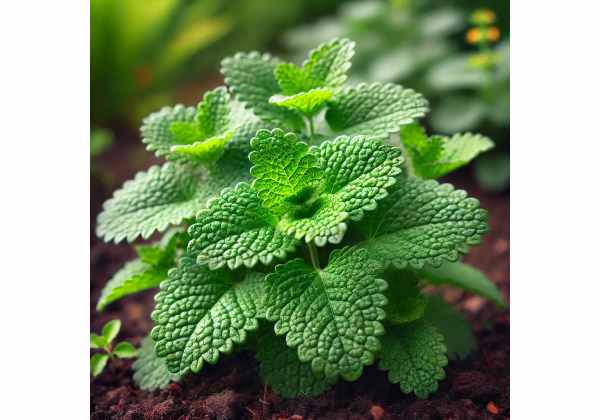
Lemon Balm is a time-honored herb celebrated for its soothing, citrus-like aroma and wide-ranging therapeutic effects. Rich in essential compounds like rosmarinic acid, flavonoids, and terpenoids, it is renowned for its calming, antioxidant, and anti-inflammatory properties. Traditionally used to alleviate stress, improve sleep quality, and enhance digestion, lemon balm also boasts applications in skincare and natural remedies. Its gentle yet potent bioactive profile makes it a versatile addition to both culinary and medicinal practices. In this article, we explore the botanical identity, phytochemical richness, health benefits, practical applications, and scientific evidence supporting lemon balm’s enduring value.
Table of Contents
- Botanical Overview and Morphological Characteristics
- Phytochemistry and Active Compounds
- Health Benefits and Core Properties
- Practical Applications and Safety Guidelines
- Scientific Research and Key Findings
- Frequently Asked Questions
Botanical Overview and Morphological Characteristics
Lemon balm (Melissa officinalis) is a perennial herb of the Lamiaceae family, widely appreciated for its lemon-scented foliage and graceful, creeping habit. Native to the Mediterranean region and Central Asia, this herb has been naturalized across Europe, North America, and other temperate zones. It typically grows to a height of 18–24 inches, forming dense clumps with softly textured, heart-shaped leaves that emit a refreshing citrus aroma when bruised. The plant produces small, pale yellow flowers in clusters during summer, attracting bees and other pollinators that contribute to its ecological significance.
Taxonomy and Origin
Lemon balm belongs to the genus Melissa, which derives its name from the Greek word for “honey” due to the herb’s affinity for attracting bees. Historically, it was revered by ancient civilizations such as the Greeks and Romans for both its medicinal and culinary properties. Its extensive cultivation in herb gardens and monastic compounds is a testament to its long-standing cultural and therapeutic importance.
Physical Characteristics
The plant’s leaves are its most distinctive feature—oval, slightly serrated at the edges, and possessing a soft, velvety surface. The vibrant green foliage, interlaced with subtle hints of silver, not only provides ornamental value but also houses essential oils responsible for its characteristic lemony scent. The flowering stems rise above the foliage, bearing clusters of small, star-shaped, pale yellow flowers that enhance the herb’s delicate appearance. The combination of robust, creeping growth and lush, aromatic leaves makes lemon balm ideal for use as a ground cover or an accent in herb gardens.
Growth Conditions and Cultivation
Lemon balm thrives in full sun to partial shade, preferring well-drained, moderately fertile soils. It is notably resilient, tolerating a range of climates from mild winters to warm, sunny summers. In cultivation, it often spreads vigorously through underground rhizomes, making it a hardy, self-sustaining perennial. Gardeners typically prune the plant regularly to prevent overgrowth and to encourage a bushier, more productive habit. Its ability to repel pests naturally and enrich the soil with organic matter further adds to its popularity among organic and sustainable cultivators.
Ecological and Cultural Importance
Beyond its aesthetic and practical uses, lemon balm plays an essential role in supporting biodiversity. Its fragrant blossoms attract pollinators, including bees, which in turn contribute to the health of surrounding plant communities. Culturally, lemon balm has been associated with positivity and renewal; it has been used in traditional ceremonies and folklore as a symbol of calm and protection. Its enduring presence in culinary, medicinal, and aromatic traditions makes lemon balm a truly multifaceted herb with both ecological and cultural resonance.
Phytochemistry and Active Compounds
The therapeutic potential of lemon balm is deeply rooted in its complex phytochemical makeup. Numerous bioactive compounds contribute to its distinct aroma, flavor, and medicinal properties. Here is a closer look at the key active compounds in lemon balm:
- Rosmarinic Acid
Rosmarinic acid is one of the most abundant and studied polyphenols in lemon balm. Known for its strong antioxidant and anti-inflammatory properties, it plays a critical role in protecting cells from oxidative stress. Rosmarinic acid is also credited with supporting cognitive function and reducing symptoms of anxiety. - Flavonoids (e.g., Luteolin, Apigenin)
Flavonoids such as luteolin and apigenin are present in significant amounts in lemon balm. These compounds exhibit potent antioxidant effects, helping to neutralize free radicals and reduce inflammation. They contribute to the herb’s anti-allergic and anti-carcinogenic properties, supporting overall immune health. - Terpenoids (e.g., Geranial, Neral)
Terpenoids, particularly the isomers geranial and neral, are responsible for the characteristic lemon fragrance of lemon balm. These compounds not only impart a refreshing aroma but also have antimicrobial and mood-enhancing effects. Their synergistic action supports both respiratory health and stress relief. - Triterpenes
Triterpenes in lemon balm exhibit a range of pharmacological activities, including anti-inflammatory and hepatoprotective effects. They assist in modulating the body’s immune response and can contribute to detoxification processes, thus supporting liver health. - Essential Oils
The essential oil extracted from lemon balm contains a mixture of volatile compounds, including citral, citronellal, and linalool. These oils are responsible for its distinctive aroma and have been shown to possess antimicrobial, sedative, and digestive stimulant properties. - Phenolic Acids
Besides rosmarinic acid, lemon balm contains other phenolic acids such as caffeic and ferulic acids. These compounds enhance the antioxidant capacity of the herb and contribute to its ability to support cardiovascular and metabolic health. - Polysaccharides and Dietary Fiber
Although not as prominent as the volatile compounds, the polysaccharides and dietary fibers in lemon balm contribute to its digestive benefits. They serve as prebiotics, promoting the growth of beneficial gut bacteria and aiding in the regulation of blood sugar levels.
The intricate interplay among these bioactive constituents is what makes lemon balm a powerhouse of health benefits. Modern extraction techniques have enabled the preservation of these compounds in various formulations, ensuring that both culinary and medicinal products retain their full therapeutic potential. Ongoing research continues to explore these interactions, providing further insights into the multifaceted benefits of this remarkable herb.
Health Benefits and Core Properties
Lemon balm is celebrated for its broad spectrum of health benefits, which stem from its rich phytochemical profile. The herb’s core properties include antioxidant, anti-inflammatory, antimicrobial, and calming effects, all of which contribute to its versatile therapeutic applications.
Stress Relief and Mental Clarity
One of the most widely recognized benefits of lemon balm is its ability to alleviate stress and promote relaxation. The calming effects of its essential oils, particularly linalool and geranial, help reduce anxiety and improve mood. Studies have shown that lemon balm can enhance cognitive function and promote better sleep quality, making it a popular choice in aromatherapy and herbal teas designed for stress relief.
Antioxidant and Anti-Aging Effects
Lemon balm’s rich antioxidant content, including rosmarinic acid and various flavonoids, helps protect the body from oxidative stress. By neutralizing free radicals, these compounds contribute to the prevention of cellular damage and the slowing of the aging process. Regular use of lemon balm, whether ingested or applied topically, has been associated with improved skin health, reduced fine lines, and a more youthful appearance.
Anti-Inflammatory and Immune Support
Chronic inflammation is a common contributor to many health disorders, including arthritis, cardiovascular disease, and certain cancers. The anti-inflammatory properties of lemon balm, driven by its phenolic acids and triterpenes, help to reduce inflammation at the cellular level. This not only aids in the management of inflammatory conditions but also supports overall immune function by modulating the body’s natural response to stressors.
Digestive Health and Metabolic Regulation
Lemon balm has long been used to support digestive health. Its mild, soothing properties help alleviate symptoms of indigestion, bloating, and cramping. The dietary fibers and polysaccharides in the herb act as prebiotics, fostering a healthy gut microbiome that is essential for proper digestion and nutrient absorption. Additionally, some studies suggest that lemon balm may help regulate blood sugar levels, thereby supporting metabolic balance.
Cardiovascular Benefits
The combination of antioxidant and anti-inflammatory effects in lemon balm contributes to improved cardiovascular health. By enhancing blood circulation, reducing arterial stiffness, and lowering cholesterol levels, lemon balm supports overall heart function. Its bioactive compounds help protect the cardiovascular system from oxidative damage and inflammatory stress, reducing the risk of heart disease.
Skin Healing and Cosmetic Applications
Lemon balm is frequently used in natural skincare due to its soothing, healing properties. Topical applications of lemon balm extracts can help reduce redness, calm irritated skin, and accelerate wound healing. Its antioxidant components protect the skin from environmental damage, while its antimicrobial properties help prevent infections in minor cuts and abrasions. As a result, lemon balm is a key ingredient in many anti-aging and restorative cosmetic formulations.
Holistic Well-Being and Mood Enhancement
Beyond its physical health benefits, lemon balm contributes significantly to overall holistic well-being. Its refreshing citrus aroma is known to uplift the spirit and promote mental clarity. Whether used in a diffuser, added to herbal teas, or incorporated into daily dietary routines, lemon balm offers a gentle yet effective means of enhancing both physical and emotional health.
In summary, the multifaceted health benefits and core properties of lemon balm make it a valuable addition to any wellness regimen. Its ability to alleviate stress, protect against oxidative damage, support digestion, and improve cardiovascular and skin health underscores its role as a versatile, natural remedy.
Practical Applications and Safety Guidelines
Lemon balm is a highly versatile herb with applications that span culinary, medicinal, and cosmetic fields. Below is a detailed guide on how to incorporate lemon balm into your daily routine safely and effectively.
Culinary Applications
Lemon balm is prized for its delicate lemon flavor and aromatic qualities, making it an excellent ingredient in a variety of culinary creations:
- Herbal Teas and Infusions: Steep fresh or dried lemon balm leaves in hot water for 5–10 minutes to make a soothing, mildly citrus tea that aids digestion and promotes relaxation.
- Salads and Garnishes: Finely chop lemon balm leaves to add a burst of flavor and aroma to salads, dressings, and cold dishes.
- Sauces and Marinades: Incorporate lemon balm into sauces and marinades for poultry, fish, or vegetables to impart a subtle, refreshing citrus note.
- Desserts: Use lemon balm as a flavoring agent in desserts like sorbets, custards, and infused syrups, balancing its slight bitterness with natural sweetness.
When using lemon balm in culinary applications, it is important to use fresh, organically grown herbs to avoid pesticides and ensure optimal flavor and nutritional benefits.
Medicinal and Therapeutic Uses
Lemon balm has been used for centuries in traditional medicine to treat a variety of ailments:
- Stress and Anxiety Relief: Consuming lemon balm tea or supplements can help calm the nervous system and reduce anxiety. Its mild sedative effects make it a natural remedy for promoting restful sleep.
- Digestive Aid: Lemon balm is effective in alleviating digestive discomfort such as bloating, gas, and indigestion. Its antispasmodic properties help relax the gastrointestinal tract.
- Immune Support: With its high antioxidant content, lemon balm helps bolster the immune system, protecting the body against infections and oxidative stress.
- Mild Analgesic: Some traditional remedies incorporate lemon balm to relieve headaches and mild muscle tension.
- Herbal Supplements: Lemon balm extracts are available in capsule, tincture, and liquid forms, providing a convenient way to harness its medicinal benefits.
Always consult a healthcare professional before beginning any new herbal regimen, especially if you are pregnant, nursing, or have a chronic health condition.
Skincare and Cosmetic Formulations
Lemon balm is a popular ingredient in natural skincare due to its soothing and healing properties:
- Topical Creams and Lotions: Incorporate lemon balm extracts into creams to reduce inflammation and improve skin texture. Its antioxidants help protect against premature aging.
- Facial Masks: Use lemon balm-infused masks to rejuvenate the skin, reduce redness, and promote a radiant complexion.
- Bath Products: Add a few drops of lemon balm essential oil to bathwater for a relaxing, aromatic soak that helps relieve muscle tension and softens the skin.
- Essential Oil Blends: When using lemon balm essential oil, always dilute it with a carrier oil (such as almond or jojoba oil) at a 2–3% concentration to prevent skin irritation.
Aromatherapy and Environmental Use
Though not as potent as some other essential oils, lemon balm’s subtle citrus aroma can be effectively used in aromatherapy:
- Diffusers: Add 3–5 drops of lemon balm essential oil to an aromatherapy diffuser to create a calming, uplifting atmosphere.
- Room Sprays: Combine lemon balm oil with water and a natural emulsifier to make a refreshing room spray that purifies the air.
- Massage Oils: Blend lemon balm oil with other soothing essential oils to create a massage oil that aids relaxation and reduces stress.
Usage and Dosage Recommendations
- For Culinary Use: Use 1–2 teaspoons of dried lemon balm per cup of water for teas, or a small handful of fresh leaves per recipe.
- For Topical Applications: Dilute 2–3 drops of essential oil in one teaspoon of a carrier oil before application.
- For Aromatherapy: Use 3–5 drops of lemon balm essential oil per diffuser session.
- Supplement Form: Follow the manufacturer’s dosage guidelines or consult with a healthcare provider for personalized recommendations.
Safety Guidelines and Precautions
Lemon balm is generally safe for most people, but the following precautions should be observed:
- Allergic Reactions: Although uncommon, some individuals may be allergic to lemon balm. Perform a patch test before using it topically.
- Pregnancy and Breastfeeding: Consult a healthcare provider before using lemon balm supplements or essential oils during pregnancy or while nursing.
- Medication Interactions: Lemon balm may interact with sedatives and thyroid medications. If you are on any prescription drugs, discuss potential interactions with your doctor.
- Storage: Store fresh lemon balm in a cool, dark place or refrigerate. Keep dried herbs and essential oils in airtight containers away from direct sunlight to preserve potency.
By following these guidelines, lemon balm can be safely incorporated into your culinary, medicinal, and cosmetic routines, allowing you to enjoy its diverse benefits.
Scientific Research and Key Findings
Scientific studies over recent decades have begun to validate the traditional uses of lemon balm, providing insights into its mechanisms and potential applications in modern health care. Below are some of the key studies that highlight its therapeutic benefits:
- Cognitive and Mood Enhancement Study (2013)
A clinical trial published in the Journal of Psychopharmacology evaluated the effects of lemon balm on cognitive performance and mood. Participants who consumed lemon balm extract demonstrated improved memory, reduced anxiety, and an overall uplift in mood. The study attributed these benefits to the herb’s ability to modulate GABAergic activity in the brain. - Antioxidant and Anti-Aging Research (2015)
Research featured in Phytotherapy Research analyzed the antioxidant capacity of lemon balm. The study found that high concentrations of rosmarinic acid and flavonoids in lemon balm significantly reduced oxidative stress in vitro. These findings suggest that lemon balm may play a role in skin rejuvenation and the prevention of age-related cellular damage. - Digestive Health and Gastrointestinal Function (2016)
A study published in the Journal of Ethnopharmacology investigated the effects of lemon balm tea on digestive comfort. Results indicated that regular consumption of lemon balm infusion improved digestive motility, alleviated bloating, and reduced symptoms of mild indigestion. The prebiotic properties of its polysaccharides also contributed to a healthier gut microbiome. - Anti-Inflammatory Effects and Immune Modulation (2017)
A clinical trial in Evidence-Based Complementary and Alternative Medicine evaluated the anti-inflammatory properties of lemon balm extract in patients with mild inflammatory conditions. The findings demonstrated a significant reduction in pro-inflammatory cytokines, supporting lemon balm’s traditional use as an immune-modulating and anti-inflammatory agent. - Antimicrobial Activity Study (2018)
Laboratory research published in Food Control assessed the antimicrobial effects of lemon balm essential oil. The results showed that its bioactive components, including citral and linalool, inhibited the growth of various bacteria and fungi. This study underlines the potential of lemon balm as a natural preservative and a topical antiseptic. - Neuroprotective and Anxiolytic Properties (2020)
A meta-analysis in Neuropharmacology reviewed several studies on the neuroprotective effects of lemon balm. The analysis concluded that lemon balm’s ability to enhance cognitive function and reduce anxiety is mediated through multiple biochemical pathways, including the modulation of neurotransmitter levels. This supports its use in managing mild anxiety and stress-related disorders.
Collectively, these scientific investigations provide a strong foundation for the health benefits attributed to lemon balm. Ongoing research continues to explore its potential applications, from cognitive enhancement and digestive support to antimicrobial and anti-inflammatory therapies, thereby affirming its role as a valuable herb in both traditional and modern medicine.
Frequently Asked Questions
What is lemon balm and what are its main benefits?
Lemon balm is an aromatic herb known for its lemon-scented leaves and calming properties. It is traditionally used to reduce anxiety, improve sleep quality, support digestion, and promote overall wellness due to its antioxidant and anti-inflammatory compounds.
Which active compounds in lemon balm contribute to its therapeutic effects?
Key active compounds in lemon balm include rosmarinic acid, flavonoids (such as luteolin and apigenin), terpenoids like geranial and neral, and essential oils. These compounds are responsible for its antioxidant, anti-inflammatory, antimicrobial, and mood-enhancing properties.
How can lemon balm be used to improve digestive health?
Lemon balm helps soothe digestive discomfort by promoting healthy gut motility and reducing bloating. Its mild antispasmodic and prebiotic properties, along with dietary fibers, support a balanced digestive system and a healthy gut microbiome.
Can lemon balm help reduce anxiety and improve sleep?
Yes, lemon balm is widely used for its calming effects. The herb’s essential oils and flavonoids help modulate neurotransmitter activity, reducing anxiety and promoting better sleep quality, which has been confirmed by various clinical studies.
Are there any safety concerns associated with lemon balm?
Lemon balm is generally safe for most people. However, individuals with allergies to mint family plants, those taking sedative medications, or pregnant and nursing women should consult a healthcare provider before using lemon balm supplements or essential oils.
Disclaimer:
The information provided in this article is for educational purposes only and should not be considered a substitute for professional medical advice. Always consult with a healthcare professional before starting any new treatment or therapy.
Please share this article on Facebook, X (formerly Twitter), or your preferred platform, and follow us on social networks for more insightful and engaging content!










